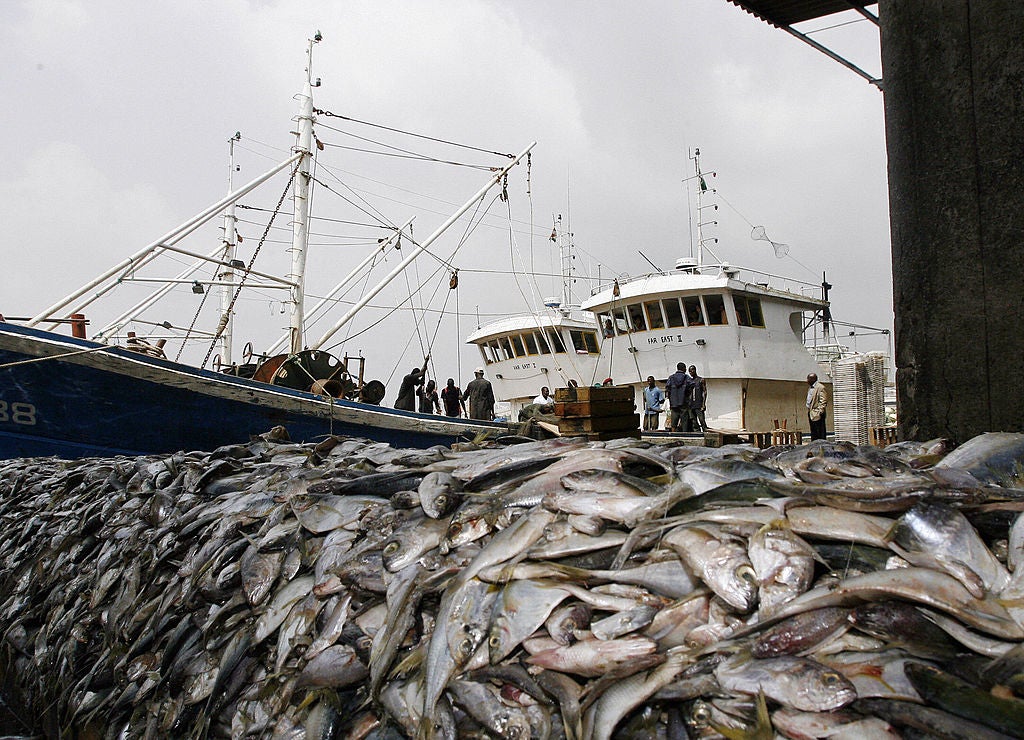Bottom trawling must be banned immediately – it’s destroying our oceans
The Climate Column: Bottom trawling releases nearly as many carbon emissions as the aviation industry. I asked decision-makers what they planned to do about it


This is a crisis. We need a ban on bottom trawling now – the practice of dropping fishing nets with heavy weights onto the ocean floor is disastrous for the planet.
Shocking new research in the journal Nature, conducted by 26 marine biologists and climate experts, has revealed that the carbon emissions released from ancient sea-bed stores into ocean waters from bottom trawling fisheries reach a billion tonnes every year – 47.7 million tonnes of which comes from trawling in UK waters.
The worst offenders, with the largest carbon emissions due to bottom trawling, are China, Russia, Italy and the UK. In Britain, bottom trawling emits the equivalent of 13 per cent of UK total terrestrial emissions, based on the emissions total of 350 million tonnes in 2019. UK emissions for agriculture, in comparison, including all livestock and crops in the UK, were 5.7 million tonnes of Co2 in the same year.
The implications of this explosive new research is dire for the bottom trawling industry. The addition of 47.7 million tonnes to the carbon footprint of fish, potentially moves it from a relatively low carbon food source to an extremely high one.
By coincidence, just as the sensational Netflix documentary Seaspiracy was launched, exposing the calamitous impacts of industrial marine wildlife-hunting, I had already submitted a query to key UK decision-makers on whether they supported an urgent ban on UK and global bottom trawling.
Seaspiracy dramatically exposed how cruel global industrial fishing is to ocean wildlife, a large amount of which is “by-catch” – species caught unintentionally by trawlers. Estimates of killed by-catch average 10 per cent globally, but can be as high as 55 per cent for shrimp trawling.
Seaspiracy revealed that the nets used for bottom trawling can be so huge that they can accommodate up to 13 jumbo-jets and the metal-weights dragged along the seafloor can weigh up to five tonnes. They scoop up everything in their path, turning teeming ocean-floor sea-forests into dead mud sea-deserts.
Nature’s research estimated that an area of 1.9 million square miles is bottom trawled each year – that’s 230 times the size of Wales.
The recovery of the seafloor eco-systems can take anything from years to decades, if they are not disturbed again during their recovery. Bottom trawling creates almost the same amount of emissions as the aviation industry, which produced 918 tonnes of Co2 emissions in 2019.
Oceans absorb up to a third of global carbon emissions, increasing their carbon content could damage their future ability to act as a crucial sink to prevent even faster global warming. Increased carbon content could also potentially speed up ocean acidification, which is another major crisis facing ocean food chains, and could wipe out some zoo-plankton populations. The Marine Conservation Society revealed in January that 98 per cent of the supposedly “protected” UK Marine Protected Areas had been bottom trawled in the previous five years.
The Nature study said a ban on bottom trawling of marine-protected areas would not only protect their rich carbon stores but could increase the amount of wild fish that could be sustainably hunted.
Labour failed to provide any comment on my query about an urgent bottom trawling ban in the UK and globally, but a Department for Environment spokesperson said: “While trawling could cause CO2 to be released from sediments, the processes are complex and the overall impact remains unclear – however we continue to build our evidence base and welcome the contribution of this paper to our evidence base.”
The government’s official advisers on climate action, the CCC, replied saying that, “emissions associated with UK marine and coastal habitats are not yet reported in the UK’s official greenhouse gas inventory.” But they said more research was needed “to assess where stronger policies are needed to protect these habitats.”
The Carbon Trust declined to provide a quote within the time requested, while a spokesperson from the National Federation of Fishermen’s Organisations (NFFO) warned there was “a disturbing trend of using over-simplistic scientific modelling with faulty assumptions as advocacy to justify an ever-greater extent of marine protected areas.” A focus on technology to reduce contact with the seabed could offer a more sustainable approach.
No one I contacted publicly supported a ban on bottom trawling or even mentioned the possibility of a future ban. We cannot afford for our governments to wash their hands of the urgent decisions needed to protect the planet, the authorities must confront the industrial emitters, and as consumers, we should avoid industrially harvested or fish-farmed fish.
I urge everyone who cares about the planet to write to the environment secretary and call for a bottom trawling ban in the UK, and for the government to negotiate a global ban at the CoP26 Summit in November. Nothing less will do.
This article was amended on 5 May 2021 to change an incorrect reference to the Marine Stewardship Council to the Marine Conservation Society.
Join our commenting forum
Join thought-provoking conversations, follow other Independent readers and see their replies
Comments
Bookmark popover
Removed from bookmarks